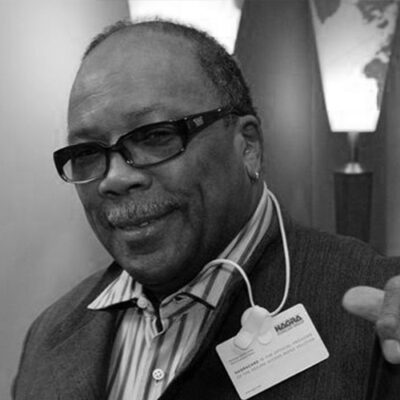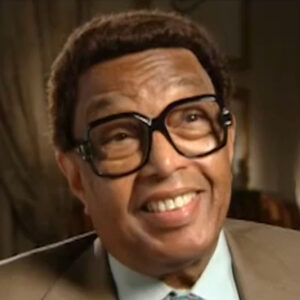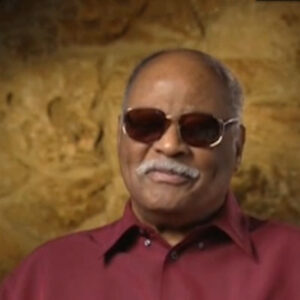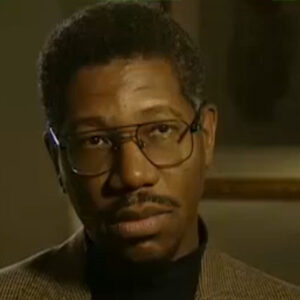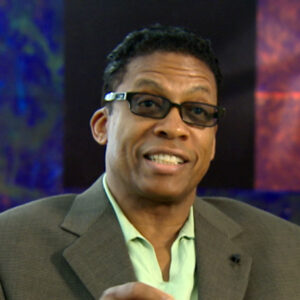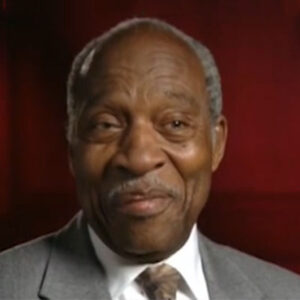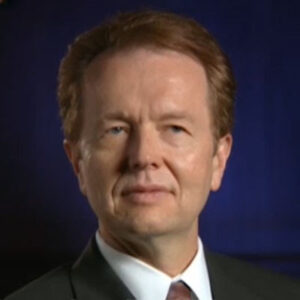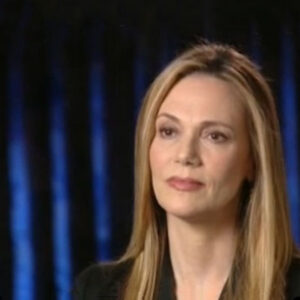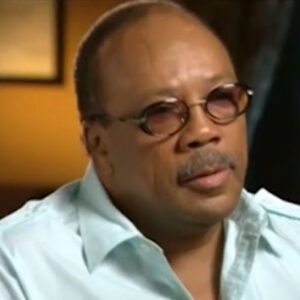Speaker Quincy, to me, is a person who basically is just doing his thing.
Speaker Now he’s out there. He’s mingling with everybody. Networking, you know, and a lot of things revolves around him. And, you know, and he evolves around a lot of things.
Speaker Now, help us now. Again, very briefly, like when you started in the music business, what you were doing and roughly at that time, like what you knew about Quincy.
Speaker Well, we always knew Quincy Jones music just from, you know, growing up and being black. You know, he always had something out there doing the brothers Johnson, you know, worked with them. So he was always a figure in in the music business. I never actually listened to any of his jazz. You know, his jazz stuff was all the stuff that he did.
Speaker But for us, when we was doing our thing and, you know, rapping and all that, you know, just somebody that was just always out in the music is, you know, his name was always out there.
Speaker Tell us, you know, if people don’t know who you are. Very briefly. You came up right at the dawn of, like, right after disco.
Speaker And we kind of pioneered, like, rap music. So I was with a group, Grandmaster Flash and the Furious Five, and we was like, you know, one of the pioneer groups, the first group to, you know, put down all the foundation stuff that finally became hip hop. And, you know, D.J. was the first deejay that, you know, did a backspin. And, you know, so he basically revolutionized the true art form of what hip hop music is and what the foundations that you guys support.
Speaker It was backscratching with records. It was different kind of thing is our world.
Speaker So when when you came up, let’s start. Right.
Speaker Well, we’re not came up. I started as an actual actually does like a break dancer like yourself before I was at the actual art form of hip hop. It was just deejaying and dancing. So if he was out in that little street scene and hanging out, you see the one or two. So what we did, the deejay that we had didn’t have a good speaking voice. He would just leave the mike there and we would actually pick up the mike and, you know, to say certain phrases and, you know, hip hop and don’t stop, though, you know, just to keep the just keep the whole thing more entertaining because it was just playing records and, you know, people dance to the music. So it was the actual entertainment value between the music and the people. That’s what you know. And then it evolved into the whole hip hop, hip hop genre and.
Speaker That then became you really came. You come into contact with Quincy before that.
Speaker Yes. The first time I met Quincy was in 84. And I did a record with Chaka Khan cause I feel for you. And it had won the regularly and the Grammys. I came out to California. I was in. I was in a in Germany. Was touring in Germany. And I came out to California to do the Grammys. And he had a setup interview with, you know, support for me to meet and talk with him. You know, drove up to his house in Bel Air. He was living in Bel Air somewhere. We kicked around for a few minutes. That was the first time I ever met. Well, often. And he always had like a project he was working on, like a Bugs Bunny project that he’d been working on for probably eons. And, you know, every time that came up or, you know, something else came up. Well, one time he flew me. I’d just like to eat dinner was having like a a class where you’d learn how to write movies and stuff like that. And he took a bunch of key people that he thought would be good to go to class. I was one of the people he brought out there. So it’s like off and on. He always, you know, involved me, involved me and like a lot of the stuff that he was doing.
Speaker And any time some some projects came up, you know, places, you know, in your chapter in the book that you’re getting a call from some people. Now just, you know, you guys, Grandmaster Flash, and you are totally at it.
Speaker And then there was a moment in your life where Quincy called you are you’re also really hurt, right?
Speaker Right now, as well as being, you know, young and just getting in the music business, it was like a lot we didn’t understand about the business as far as, you know, just being famous and all the negative elements involved, you know, drugs and just the late nights and parties and that kind of really, you know, took his toll on the group. And, you know, everybody got kind of like got strung out. You know, I was sort of smoked crack before, you know, high of we, you know, the whole nine yards, the whole group. So everybody but then everybody broke up and they went their separate ways. And I guess, you know, Quincy just, you know, of being who he was and me and him having a good relationship.
Speaker Yes. You know, whenever whatever happened to Mel. So he’s asking people around, you know. Yeah. Anybody ever seen Mel? Let’s say he’s in jail right now. You know, he’s cracked out, you know, all these different stories that’s coming back to him. So he sent word to the street, you know, I was living in the Bronx. I didn’t have a phone, anything. I didn’t know nothing. And, you know. Yeah. Quincy wants you to do what? Christie wants to talk to you. You know, something good is going to be some big deal. You know, my life is going to change. Call Quincy on to play for your country. What’s going on? You know? How are you doing now? You know what’s happening. You know, just just the fact that a man of Quincy stature, you know, was asking how I’m doing at a point where, you know, I wasn’t doing too good. It kind of made me want to just, you know, pull up my bootstraps and, you know, just kind of get myself together because it was somebody that was thinking about me, you know? I mean. So coming from the position where he was like, you know, you being what, you know, worldwide, you are nationally known to the point where, you know, it ain’t nothing happening. And then, you know, that’s that low one light that comes out the sky. You know, I’m saying Quincy is thinking about you, you know. So it wasn’t like it was a big record deal or anything in the making.
Speaker But it’s just the fact that he was thinking about me that made me realize that, you know, I did have a little bit of push in me so I can just, you know, get myself together and it just, you know, maintain in other words and just, you know, keep keep myself on a level. Whereas I, you know, I could be workable. And it did a lot for me. Just that one phone call to the whole left me.
Speaker Quincy sighs You know, I mean, you guys, in a way, pioneered a new kind of music. But that’s what Quincy is all about, right? Right. You know, you start making music.
Speaker Quincy is always into recategorized music or however you want to, as this whole thing is like just getting all all the different aspects of music and, you know, kind of like blending and Jelen things together, which is which is what music is supposed to be about, you know. And so he got the idea back on the block with African singers and rappers, you know, some sing and drummers and just, you know, you put all this together and just to come with a body of work that, you know, everybody can relate to and understand and is like and not too many people can actually go about doing that because everybody likes to understand about what the next man is doing to make it possible. Whereas Quincy is one of those kind of people, he have a good level of understanding about a lot of the thing that’s going on to put something like that together. So with the African drummers and with the rappers and then with the different guys, this plan estimates the musicians and the singers. He could put it all together and it won’t be like, you know, like some crazy it’d be like a good body of work. And that’s what Back to Back on the Black Album was all about. Barry White, Big Daddy Kane. You know, some old jazz singers. You know, some Sarah Vaughan, you know, just put all that together because we have an understanding of what they do and then what all that means in music and.
Speaker Can he make stuff like that work where the average person wouldn’t be able to do it? You know, Quincy does it very well.
Speaker Well, you know, different things. You worked on the song studio. You remember best in terms of your participation.
Speaker Well, just the fact that, like, as far as me being a rapper and this is like rapper and rap, and in the beginning I was like renegade music. So we didn’t get basically the kind of respect from other musicians or, you know, from people like this on the level of R&D.
Speaker You know, we didn’t get the kind of respect, but the fact that we was working with Quincy on his album and just being in the studio the way we was treated, it made me feel more like more like a musician, because when we was coming up, we was disrespected by musicians. They didn’t really respect what rap was. Being that Quincy had a certain amount of respect for what we did and everybody treated us, you know, like we were like we should be treated like we was part of the family, like a part of a musical family instead of. Oh, yeah, those guys, you know, they from the Bronx, you know, they get high and, you know, they might steal something. You know, it was like we was part of this musical family. And Quincy set it up so that it would be like that. And that’s probably why he got the performance that he did from everybody, cause he sets up an environment where you feel comfortable doing what you do best and that’s what make the whole thing play out.
Speaker Well, it’s great.
Speaker Really great. It’s great. Tell me what you think. Quincy is a pioneer or leader where we just talk to somebody?
Speaker Well, Nelson Mandela. But there’s something about on the one hand, Nelson Mandela, Clinton, whoever up the ghetto and having experienced that very tough childhood, haven’t really fought to get where he was before. He’s very comfortable, really easy.
Speaker Well, you know, Quincy is not afraid, you know, to live and to do his thing. You know, he don’t he don’t worry about what black people say if around white people too much or vice versa. You know, to. He’s out there. He’s not a coward. In other words, like, if he was like maybe 15 or 20 guys in the world like Quincy, it would be a totally different thing going on because he’s not afraid to just go out there and be who he is.
Speaker I mean, he didn’t let white people down. You don’t let black people hold him back. Michael Yo, you know, he’s marrying white women, you know? You know, he just he’s out there and he’s doing his thing and he handles himself, you know, very, very gentlemanly. You know, he treats everybody accordingly to high. You know, they treat him and he’s just not afraid. You know, he’s not a coward. You have, like, a lot of people out there, you know, and that’s like he’s from a far racially, musically, you know, what a coward, you know. I mean, like a lot of brothers, you know, they don’t want to sit down around white people. They feel intimidated in the same way with black people. You know, you don’t want to go around them. Black guys know somebody might hit me upside the head. You know, it might take my go watch, you know, quit singing like that. When I first went to his house, they you know, it’s all I just got to jail. I was a crackhead. He just flew me out, you know, and I came to his house like you at me, like he was scared I might steal. One is Graham. He’s try to hide it under my coat. Erotomania is like, you know, he’s he’s a brave he’s he’s got a brave soul, even even that type of music, you know, just trying a different kind of music. If you do jazz and you’re not a mean average, Jabba’s now we go try to mess with that hip hop dance. You know, they write it off like it’s barely moved to I’m not gonna mess it up. I’m not gonna do Frank Sinatra’s album. You know, that’s not my thing. Let me just stick to this. You know, he’s got got a brave soul as far as dealing with people and dealing with music.
Speaker That’s what makes them, you know, like to stand out as far as, you know, dealing with people and just being who he is and being who he is to to the music industry and life itself.
Speaker Right.
Speaker Why do you think that you’re saying I mean, it’s like saying why was the concert.
Speaker Well, I guess is that where, you know, you got to like people you’re not I mean, you just got to like just being being in the mix, you know, it’s like being who he is and then the deal dealing it and the level of music that he dealt with, like in like, say we do what Michael Jackson did, Frank Sinatra, all these people.
Speaker And then when rap comes along, the average person would think, like of Quincy Jones stature would take this rap. This rap sheet is like way beneath me. This is like real low level. I don’t even want to come in contact with you. But, you know, he have kids and, you know, he’s, you know, seeing what’s going on with them. And as a man of no good wisdom, he’s like, okay, now I can see where is going here. And he was the first ones to, like, actually really latch onto it. And then even to tell other people a man is rapping is something to us, you know? I mean, we could. Take this off. You know, it could all be you. And it always all music is a good thing, you know, so easy. He’s got that good intellect, you know. And he’s always susceptible to to be able to adapt and and to change and to make other things adapt into what he’s doing also.
Speaker That was his son.
Speaker He tweeted like maybe a couple of topics. Oh, yeah. OK. OK. His son was involved in his son, Tutee three was involved in back on the bucketing aspect of his program. A couple of beats on album just to make it, you know, real hip hop ish, you know, because you always did that, that that the basic root in hip hop always comes with the beat. So you always you had to have this like that, the basic hip hop beat. And that’s what Kudi three did.
Speaker As far as his contribution today, how can you. I mean, is there a basic beat that you can just demonstrate for us?
Speaker That’s one of the basic features, really?
Speaker Well, I mean, any any of as far as hip hop or is is any beat could be a basic piece. You know, just to want to tap a pool, tap, tap, tap, you know, is just snare bass. So it’s all just the those basic basic drums. You know, the basic hip hop beat would be like, yo, James Brown, funky drummer kind of beat. You know, it’s real funky.
Speaker What about, you know.
Speaker You know, I know Quincy very much interested peace in the world.
Speaker He’s such a loving guy.
Speaker But in terms of creating that album, I mean, so much rap energy is connected to violence or confrontation. Did he ever say he was trying to steer it toward a certain kind of message?
Speaker No. Well, the one the one thing from from me delinquency Indian for me, actually being in the studio and watching what he does is he won’t necessarily ever tell you what to do. He just set up the environment and then just set the mode of what’s going on.
Speaker And then he let the musician create he like I never seen them, you know, tell somebody what not to play unless the note that they played was awful. K was flat, right? They are. I mean, maybe you could change it like that. But he never in his never, ever told me as far as what to write.
Speaker He just set the tone and then he let everybody do what they do. And then that’s how it comes out best, like, you know, obviously.
Speaker And even from my point of view, I mean, from what I was doing back then. No. Nobody was actually a negative rap. I mean, ice ice tea might have been kind of like a gangster rap. But then working with Quincy Jones, he didn’t actually tell us, gee, we don’t want no gay album. He just set the tone. Denyse wrote something that was closest to his personality that actually fit what we was doing on the song. So he just let you be you. You know, that’s that’s the main that’s the main thing that makes him a great producer. I tell producers all the time, like, you know, maybe what you should do and then, you know, trying to tell a singer how to sing. It’s like I can work with the best producers in the world. They don’t do that. I never seen Quincy do that in New York. Well, you sing it like that. I maybe should say it like that. You don’t go. I’ll get it out of him. You just got to set the tone and, you know, just set in the right environment and, you know, the best to come out if you make a person feel comfortable at what they are doing and what they what you’re trying to get them to do and that that’s what Quincy does.
Speaker What about just a sense of humor? I mean, Quincy is wonderful off color jokes there, stories he told you to get here, which are worth recounting.
Speaker Well, so many is hard to remember, Molly. Jesse, you got about nine million stories like you probably lived like 50 lives. So, you know, just to think of just one in particular, you know, it’s kind of hard.
Speaker I would say to was your last night, she was involved in that.
Speaker Yes, she was involved in the back on the blackout. Tell dirty jokes. You say dirty jokes. Right.
Speaker You know, I think we’ve pretty much covered the kind of questions that I wanted to. That’s just kind of one thing that I wanted to touch on. If I wrote. It’s a really broad question. But. Apart from that phone call, where do you get your point? Are there other times that he’s inspired you or just just him being who he is?
Speaker And just for me being around him and, you know, kind of like this.
Speaker As far as dealing with other people, like, you know, you like being, you know, his lack of intimidation for dealing with people, you know, as I try to, you know, handle myself. You know, I could be around white people and feel comfortable. You know, to be around brothers is like a lot of times, you know, a lot of brothers, that being a business, you know, they want to go to the upscale club, you know, and be around, you know, all the different kind of people. And I can go to the downlow club and just be around the brothers and don’t be scared. And, you know, I could just be more flexible. You know, you just gotta you always got to have open mind about things, even with music. All the different kind of. You got to have really open mind. Pop music, rock music, rock reggae. Got to have open mind about things because, you know, everything is basically the same thing when you look at it. You know, every God is basically the same God. When you look at it, you just might call it. One thing is, you know, it’s the same thing.
Speaker Let me just come back to you. Did. Things beginning before we started. Nowadays, categorization is not the same. There’s so much more process. Just start the sentence with 19 around 1990, one year we get back on the block was trying to break out.
Speaker And in fact, now when you look around what’s right and I think it was a 90 or whatever year that we made back on the block, what Quincy was trying to do was make something that would crossover, you know, to all the different categories of music to whereas now. No. That’s how music is. Everything is totally crossover. You know, you people put out a record and wants to video gets played on MTV. You know, Ice Cube is pop. You know, black people like Backstreet Boys. Eminem is the lyricist of year. You know, everything is total, totally crossover. You know, the Moulin Rouge record got, you know, little Kim on it, pink, you know, to me. So musically and that and what Quincy what Quincy did, what a lot of his music actually brought about, the kind of change to to make things crossover like that, because other annatto would have just been we would have been rapping, you know. And all the jazz cats would have been doing jazz and all Aunt Bee would’ve stuck today, kind of today kind of thing.
Speaker But, you know, it takes, you know, like like a trailblazer like Quincy to put all those things together. And then he would show the next person, like, you know, these rappers, you know, all of them ain’t angry at the world. You know, you can work with some of these guys and you can build with them and you could just, you know, make the whole music stronger to wear it like that today.
Speaker You know, everything is basically MTV. Everything is pop culture. Rap is pop is, you know, RB is rock. So I’ll get.
Speaker Well, I mean, basically, I mean, basically the way the way it made me feel was is like now we always tell everybody it’s like I know everybody in the world.
Speaker As far as especially in the rap business, you know, I’ve seen everybody calm. Everybody in the business came after what we was doing.
Speaker So now knowing all these people and now you supposedly you got millions of friends, you should be able to call on somebody or if you have nothing else, somebody should be thinking about you being that, you know, all these people have always been a good guy. Never step on nobodies, you know. No. On nobody’s toes. You know, always been the kind of person that would be respectful toward people. So, you know, like when things went bad for me.
Speaker I’m not saying, like, somebody is going to give me a handout, but where was all these people that knew me and shook my hand and. Hey, Mel. Yeah. And I was gonna be all right. You know, none of these people were around when when when nothing was going on. But then it took, you know you know, somebody like Quincy for just to even get these people to talk to me is like, you know, like these people. Oh, yeah. I mean, Quincy is looking for you that these people wouldn’t even talk to me. Quincy, wouldn’t it? You know, like when you see them. Yeah. He’s now doing well, you know, tell where you see Mel. You know, tell me give me a call. These are the same people. I’ll probably walk over my dead body and know that they came to you. Okay. Call Putih. So it’s like, you know, it’s like I’ll say it made me feel like I had it made me feel more about what I was worth because, you know, somebody was thinking about me.
Speaker And that’s what I’m saying. And I always, you know, think to myself, like, if I wanted to make a choice between doing business with Quincy and making, you know, a million dollars or five million, ten million dollars, you know, working with Quincy or just to have him as a friend, I’d take the friendship over the business because I know the friendship would outlast the business. You know, to me, because what he did for me as a friend meant more than if he would he gave me a record deal because I probably wouldn’t have been able to deal with it anyway. I was, you know, trying to, you know, work, work or with a drug habit, you know, just. And it probably wouldn’t work. But just the fact that he showed that he was trying to be a friend, like, you know, Mel, you know, how you doing? You know what’s going on. You know, it meant a lot more. So like I said, if I had had to choose between making money with Quincy and just being a friend, I don’t matter. I’d never have to do business with him as long as, you know, I mean, I could stay on the same level. He speak good about me, ask be good about him. When we get together, we, you know, exchange some good words, you know, just be good friends toward each other. That means, you know, more and all the money in the world just to have, you know, just to say, yeah, I know Quincy. He’s my friend.
Speaker All right.
Speaker Thank you so much. We just sit. Now he said for 20 seconds for room.
Speaker Tom, just quietly. This is room Tom.
Speaker Room. Thank you so much.

